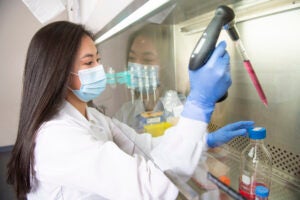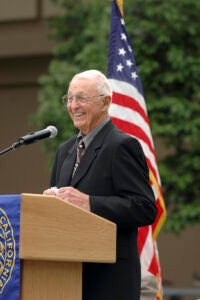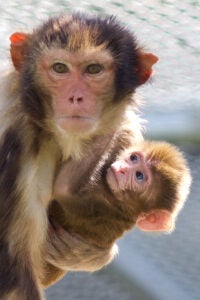“Let us put our minds together and see what life we can make for our children.” —Sitting Bull
This past year has provided all of us a dramatic view of how much our world can change when events such as pandemics disregard borders and alter life plans. History tells us that our current situation is not unique, but has distinctive factors that will shape our future. Our school was created in reaction to real threats to the livestock industry in California. In the middle of the past century, devastating diseases of cattle and other livestock not only impacted the state’s food supply, but also the nation’s economic stability. Since 1948, we have addressed issues facing our communities, while training the next generation of those that advance animal health, and by extension human and environmental health.
Our extensive history of educating veterinarians and scientists, and discovering new knowledge through research, has set high standards of cross disciplinary collaborations to solve critical issues in veterinary medicine, agricultural sciences, and public health. For more than 70 years, our faculty and staff have developed new disciplines, novel clinical treatments and advanced the One Health approach to address complex issues at the interface of animals, people and the environment.
In the early 1960’s when former dean William (Bill) Pritchard was recruited to UC Davis by Chancellor Emil Mrak, our campus was transforming into a modern university that would have global impact. In 1962, Dr. Pritchard began a 20-year tenure as dean, leading major expansions in facilities and the professional curriculum to meet the evolving needs of society. His vision, molded by both a DVM and JD degree, fueled the expansion of new specialties and the recruitment of founding members of the profession.
During this same time period, Professors Peter Kennedy, Harvey Olander and Jack Howarth documented the pathology of epizootic bovine abortion, a disease of great economic importance to California cattle ranchers then and now. As recently documented, faculty member Dr. Jeffrey Stott’s research culminated in a new vaccine against this same disease. Throughout the 1960’s, Dr. Terrell Holliday used his curiosity and cross disciplinary work to develop the new specialty of veterinary neurology. His legacy lives on through our comprehensive clinical neurology services and an array of neurosciences research programs at our school and across campus.
In 1962, the California National Primate Research Center (CNPRC) was established, beginning an era that has led to remarkable discoveries ranging from the effects of air pollution in respiratory diseases, to the influence of aging on cognition, and new nonhuman primate models of another emerging pandemic, HIV-1 associated AIDS. This heritage continues through the recent work of Dr. Smita Iyer and colleagues, who demonstrated SARS-CoV-2 protective immune responses from rhesus monkey studies.
As society was changing in the 1960’s, our school was also changing. Margaret Meyer became the first woman at UC Davis to obtain a doctorate degree in comparative pathology. She later earned distinction as the nation’s first professor of veterinary public health in research microbiology. We now embrace the diversity of talent, ideas, and backgrounds of all society members to fully realize our potential to contribute to today’s problems facing our communities.
These examples are a few of many impacts we have made while facing global challenges since the opening of the school. While we are focused on the current COVID-19 pandemic and its profound disruption across the world, it is useful to reflect on how we have responded to the challenges our society has faced in the past. Since the establishment of our school, we have had a unique and evolving responsibility to address the problems facing our world by using our talents, skills, knowledge and creativity to build a better life for future generations.



